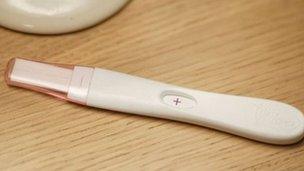Draft NI abortion guidelines published by minister
- Published

Thousands of women travel to other parts of the UK each year for a termination
The Northern Ireland health minister, Edwin Poots, has circulated a 30 page draft document to executive colleagues on long-awaited abortion guidelines.
The draft guidelines propose that two doctors rather than one should make the assessment.
It describes as a grey area the lawfulness of advocating or promoting terminations outside Northern Ireland.
The draft guidelines are still being considered by ministers and will be consulted on for 16 weeks.
The document, titled 'the limited circumstances for lawful termination in Northern Ireland', include a recommendation that a consultant psychiatrist should be involved where a mental health assessment is required.
There is an allowance for conscientious objection and a new section dealing with accountability and collecting data on each abortion - the reason given must be clearly documented.
Abortion is only allowed in very restricted circumstances in Northern Ireland.
Justice Minister David Ford has called for clarification on some of the guidelines and said the document could lead to more confusion.
"On an issue like abortion we need to have a law which is absolutely clear and not something that brings further confusion and disarray to the legislation," he said.
In February, a judicial review in the High Court by the Family Planning Association (FPA) to have guidelines issued on the law on abortion in Northern Ireland, was halted after the department of health promised to publish draft advice within a week.
The FPA had been campaigning for more than a decade for guidelines to be issued on abortion for the NHS in Northern Ireland.
After previous legal action by the charity, the department of health issued a 20-page document in 2009 containing guidance for health professionals on the termination of pregnancy in Northern Ireland.
'No status'
It was withdrawn the following year after a successful legal challenge by anti-abortion campaigners led to a ruling that sections on counselling and conscientious objection should be rewritten.
The Royal College of Obstetricians and Gynaecologists said its members were working from the earlier draft guidelines, described by government officials as having "no status".
Meanwhile, two Stormont assembly members are attempting to change the law to make it illegal to perform an abortion outside the NHS. It follows the opening of the private Marie Stopes International clinic in Belfast last year.
The DUP's Paul Givan, who chairs the justice committee, and the SDLP's Alban Maginness have tabled a joint amendment to the Criminal Justice Bill.
The laws covering abortion in Northern Ireland are the 1861 Offences against the Person Act, and the Criminal Justice act from 1945. It is a criminal offence, which carries a life sentence.
The only exceptions are to save a woman's life, or if there is a risk of permanent and serious damage to her mental or physical health.
Last year official figures confirmed that at least 40 terminations a year are carried out on these grounds.
More than a thousand women a year who do not fit in these categories travel from Northern Ireland each year to have an abortion in other parts of the UK.
In England, Wales and Scotland access to abortion is covered by the 1967 Abortion Act. That permits terminations up to 24 weeks of pregnancy on grounds that include risk to the physical or mental health of the woman or existing children in the family, and abnormalities that could lead to a child being "seriously handicapped".
It is also allowed over 24 weeks if a woman's life or health is at serious risk, and for serious disabilities.
- Published27 February 2013
- Published27 February 2013
- Published19 February 2013
- Published4 February 2013